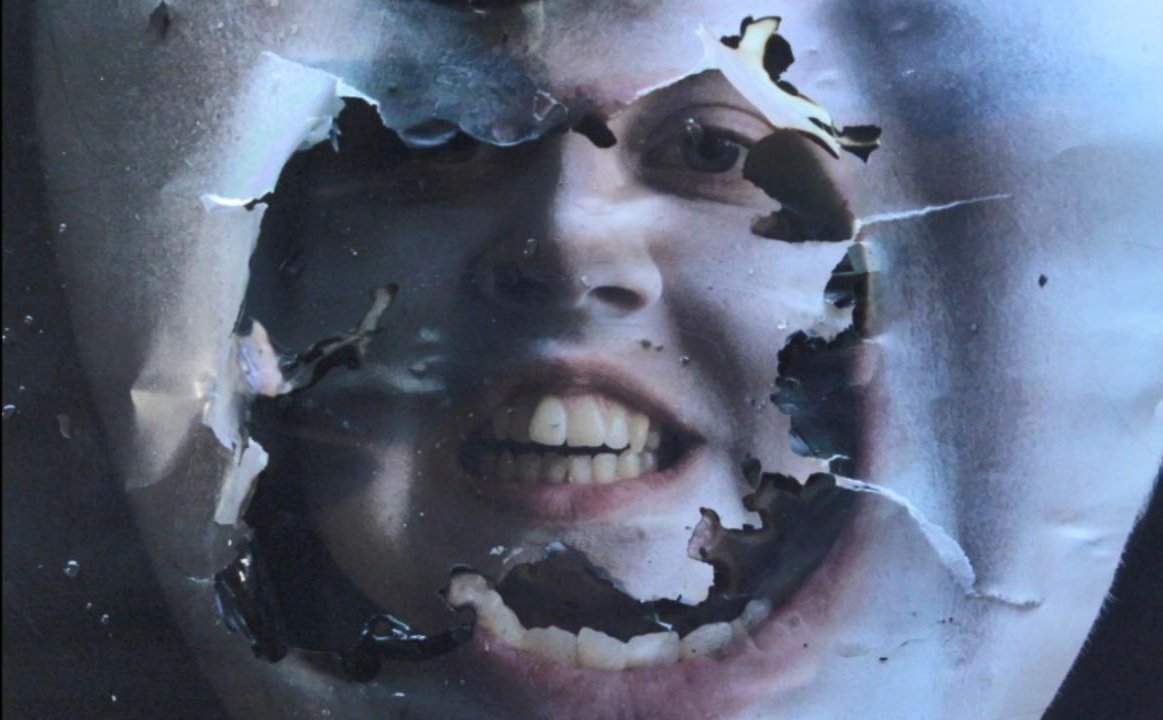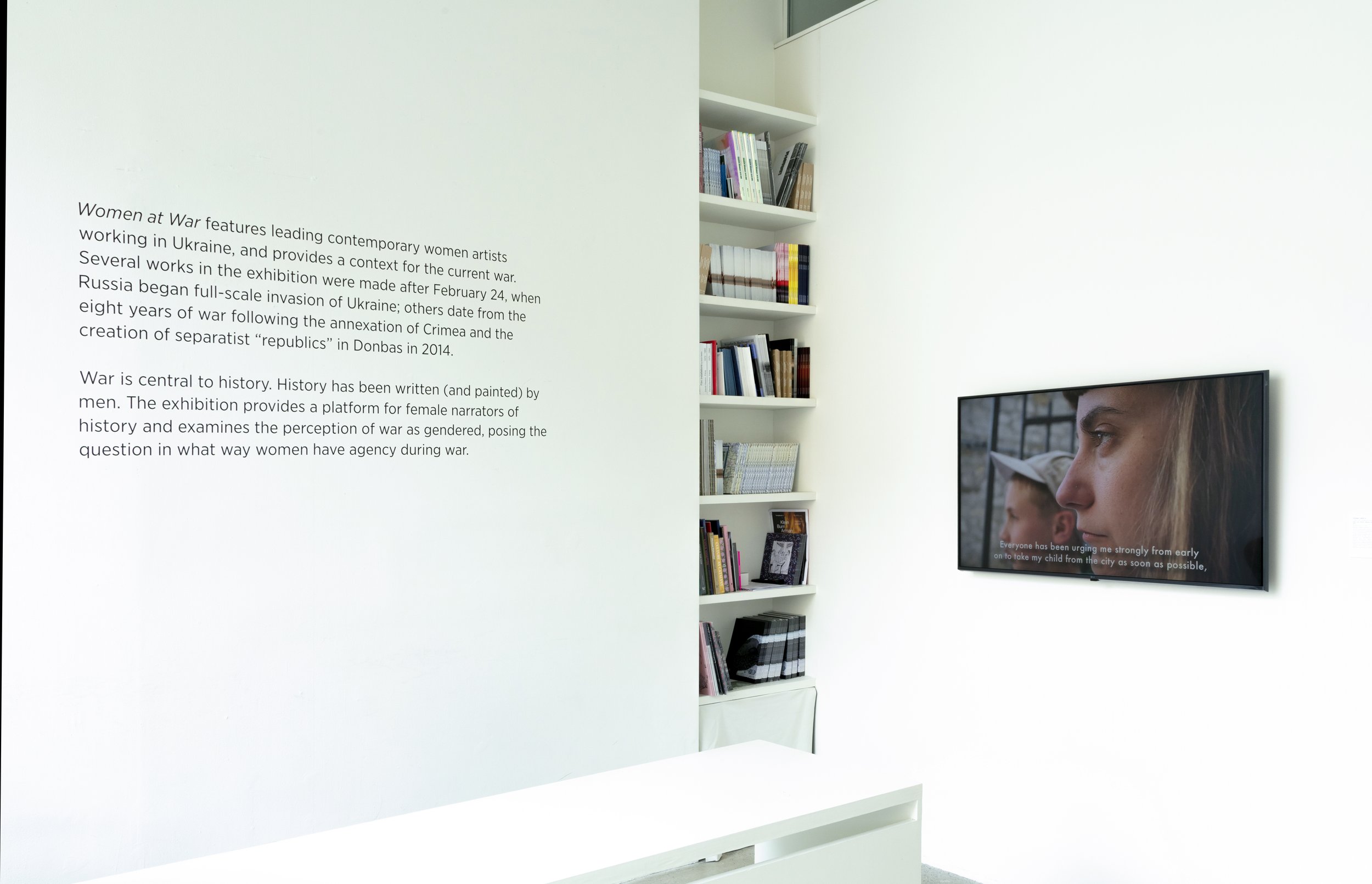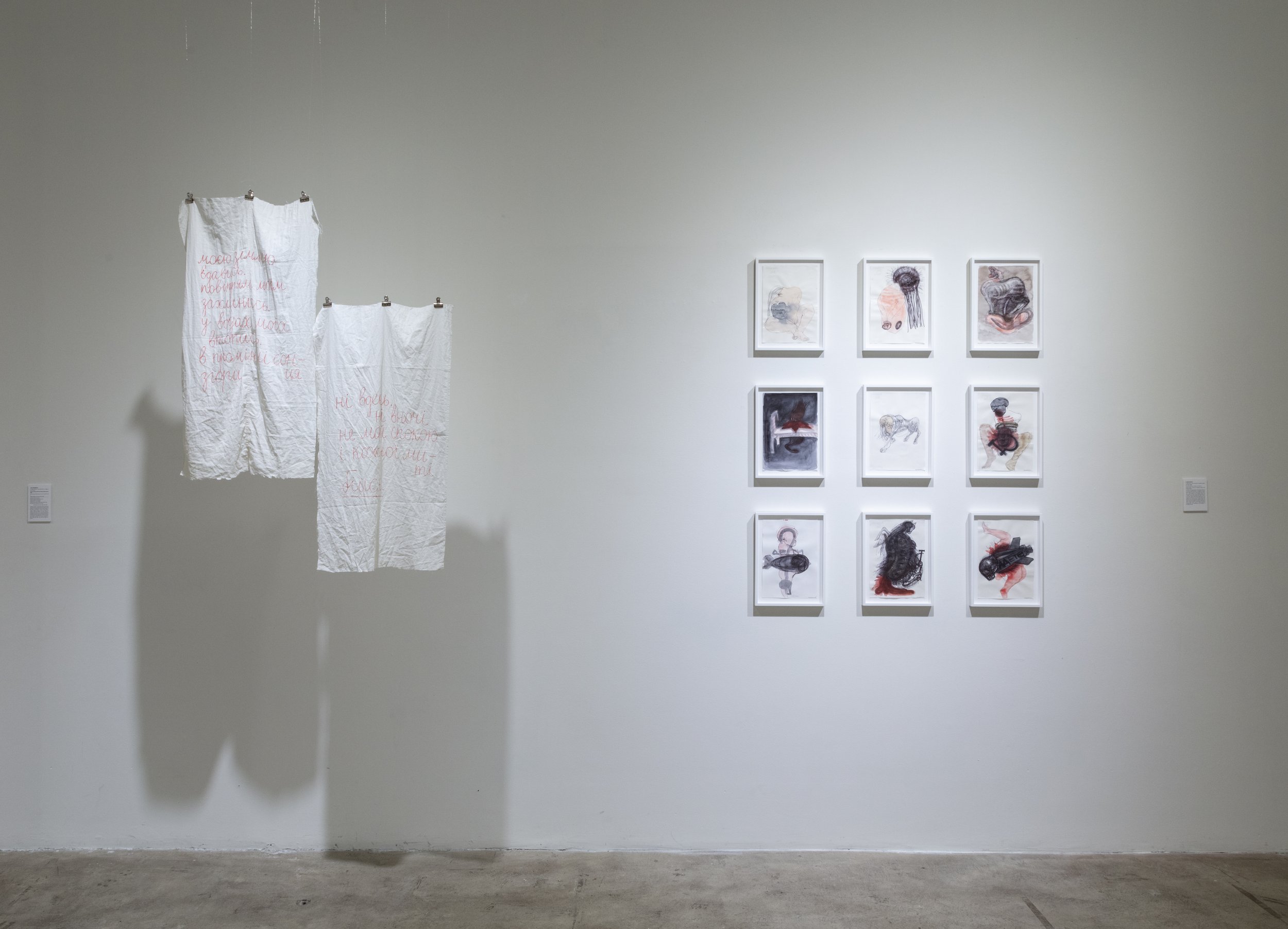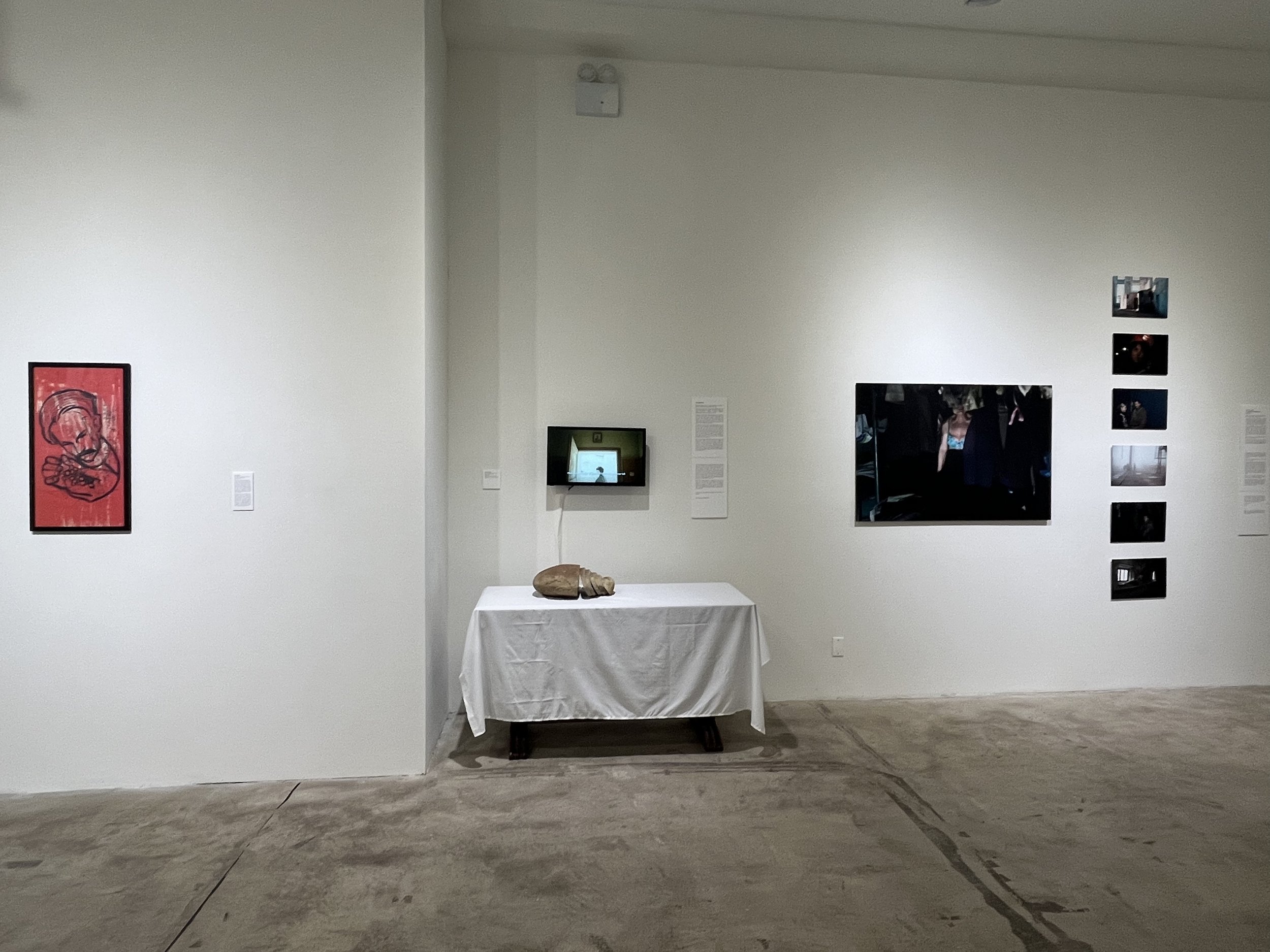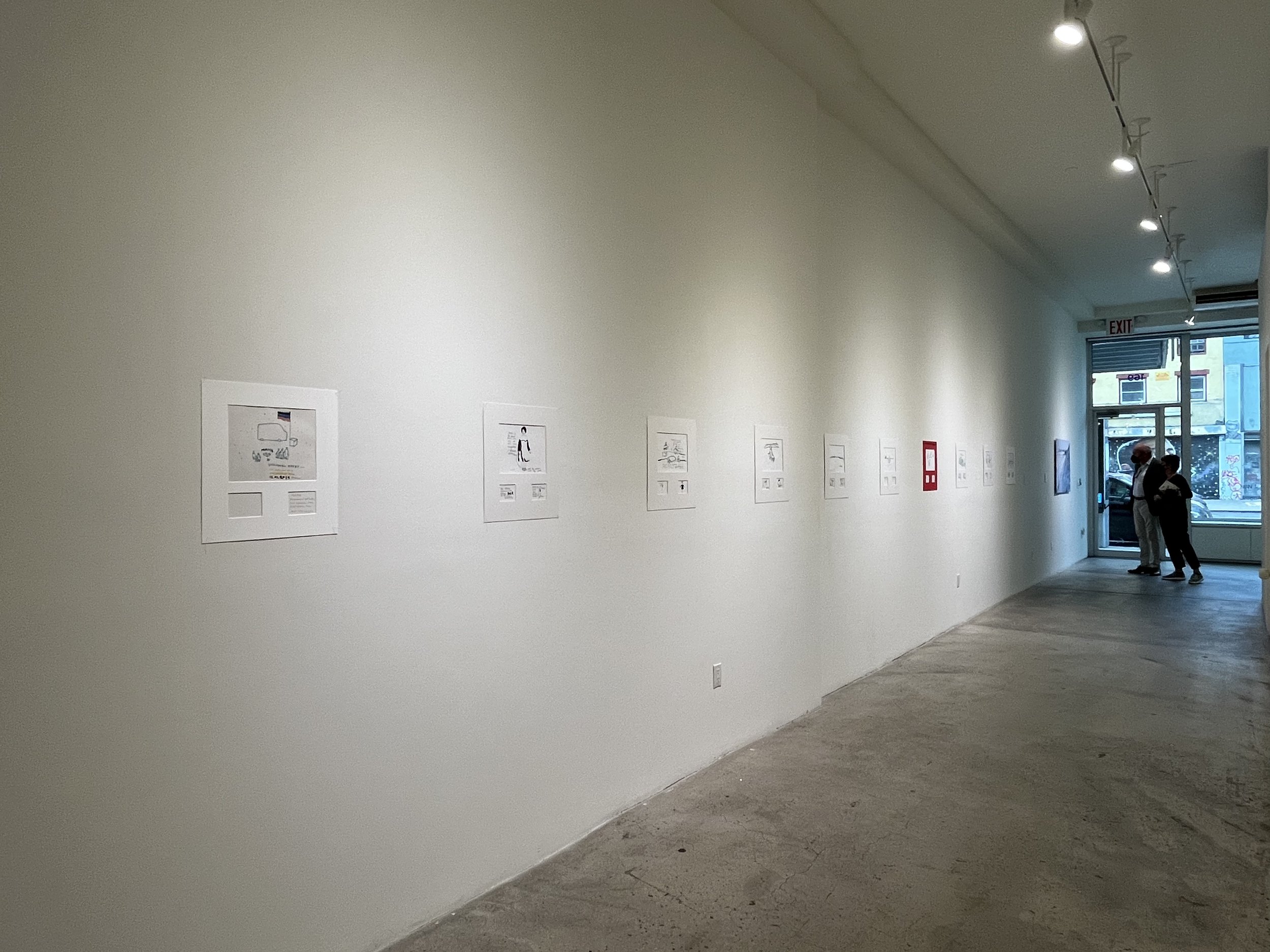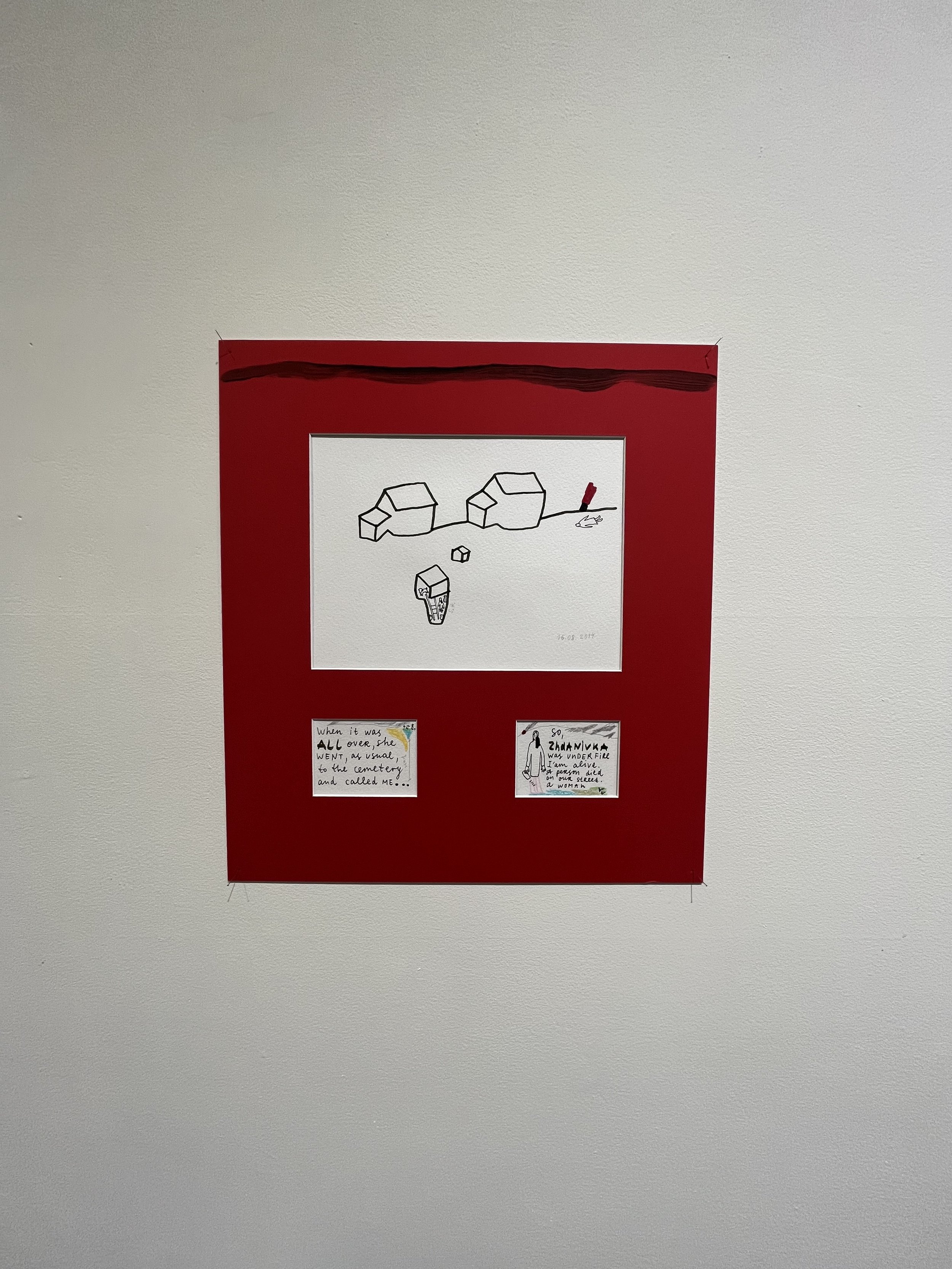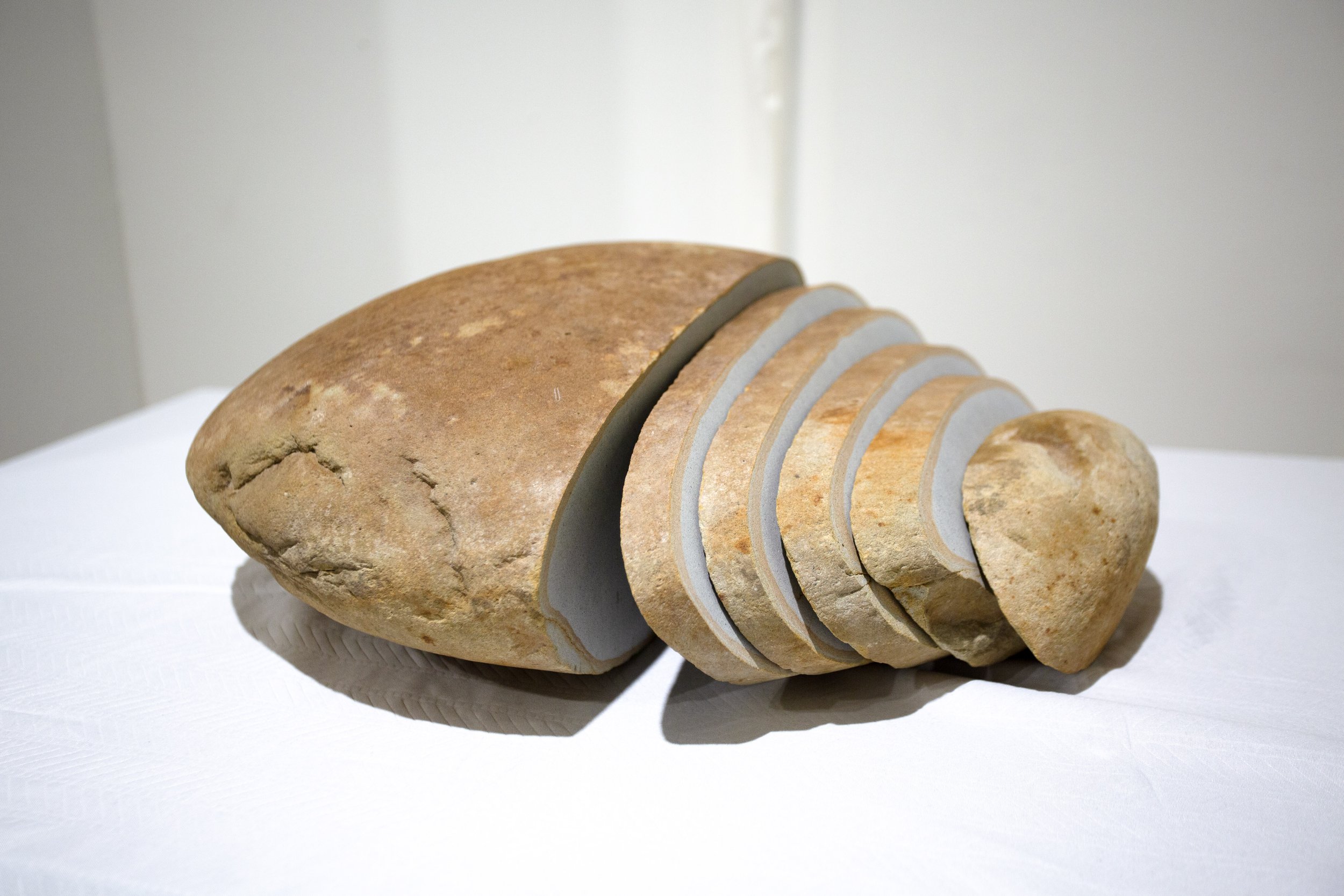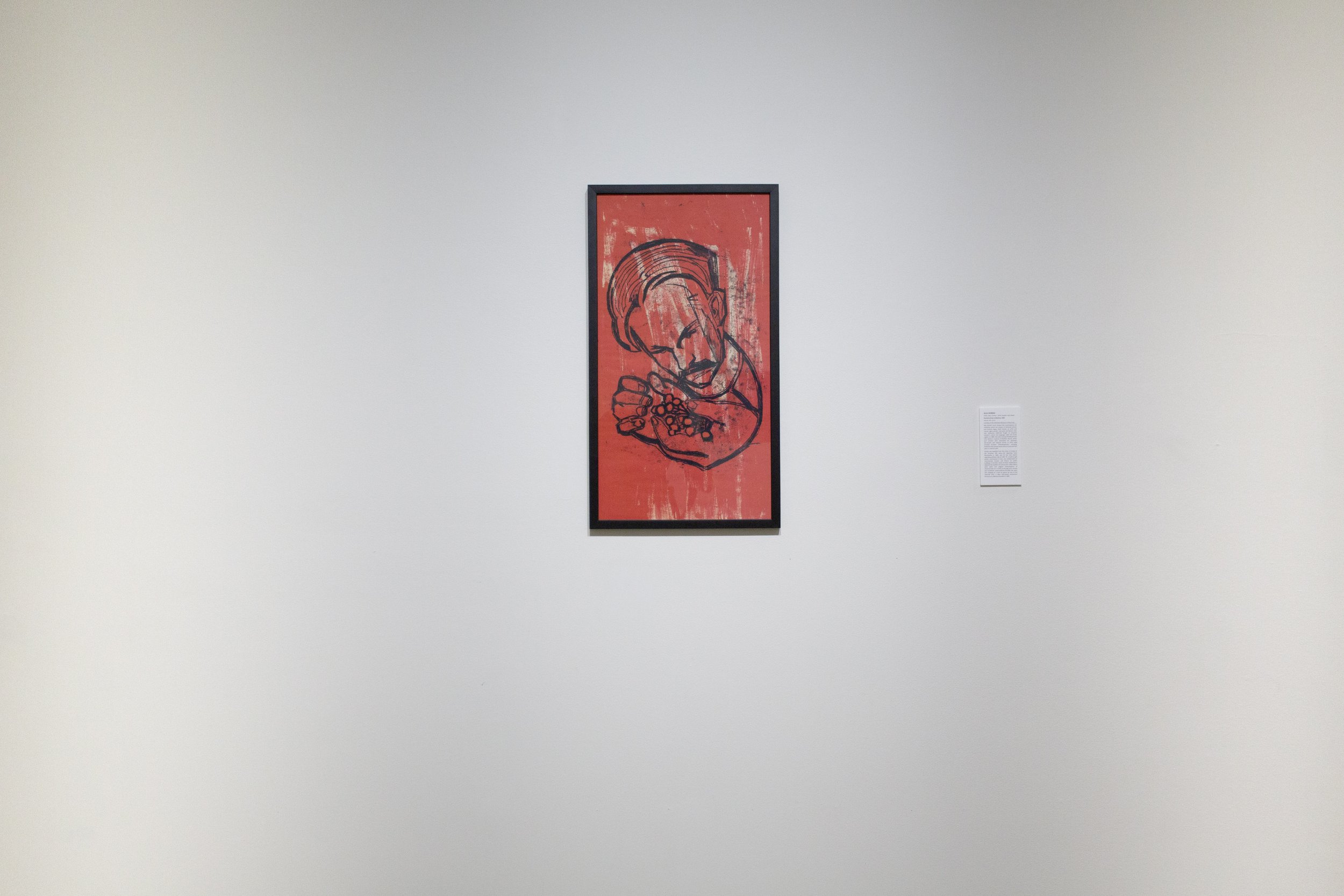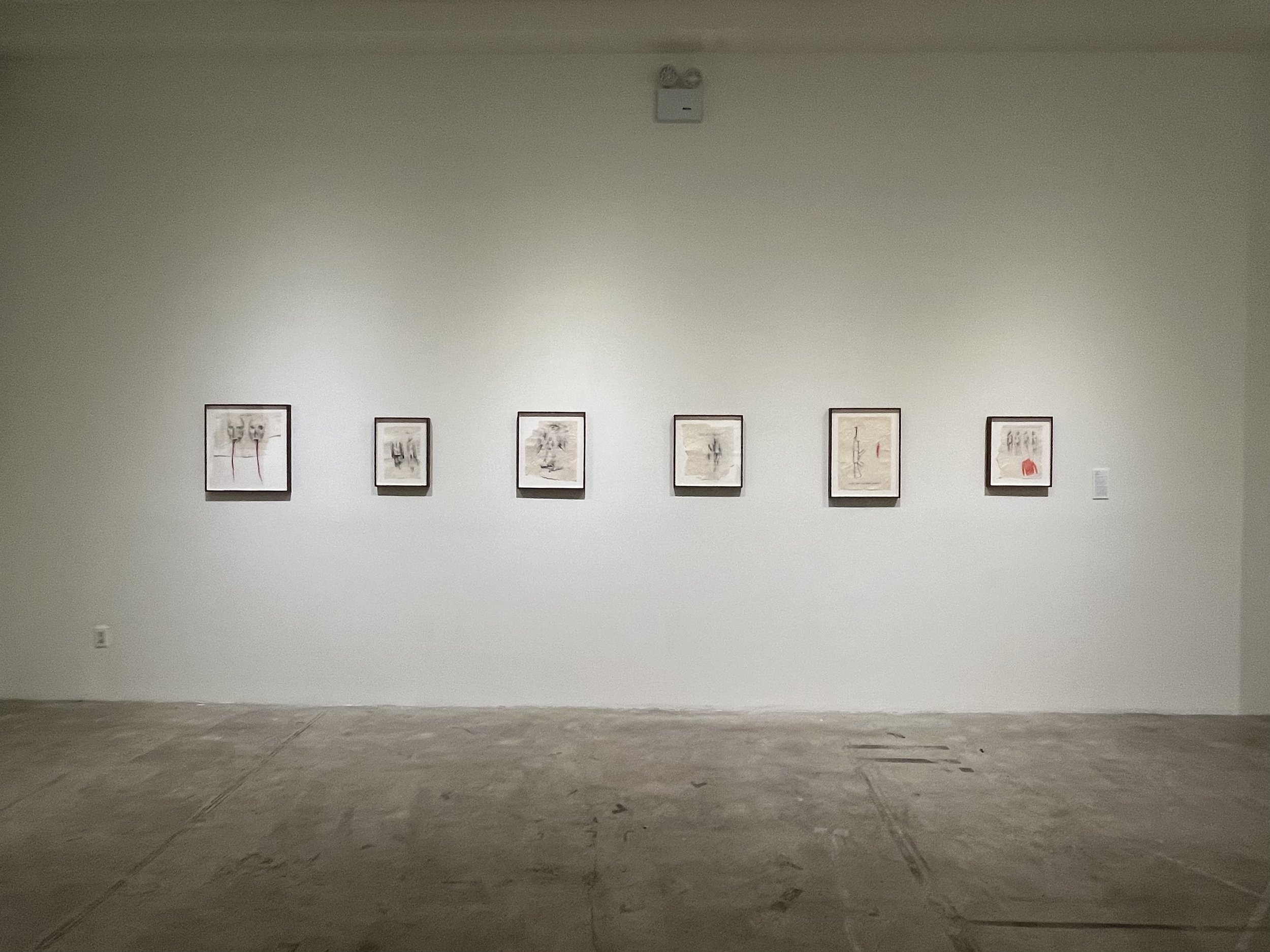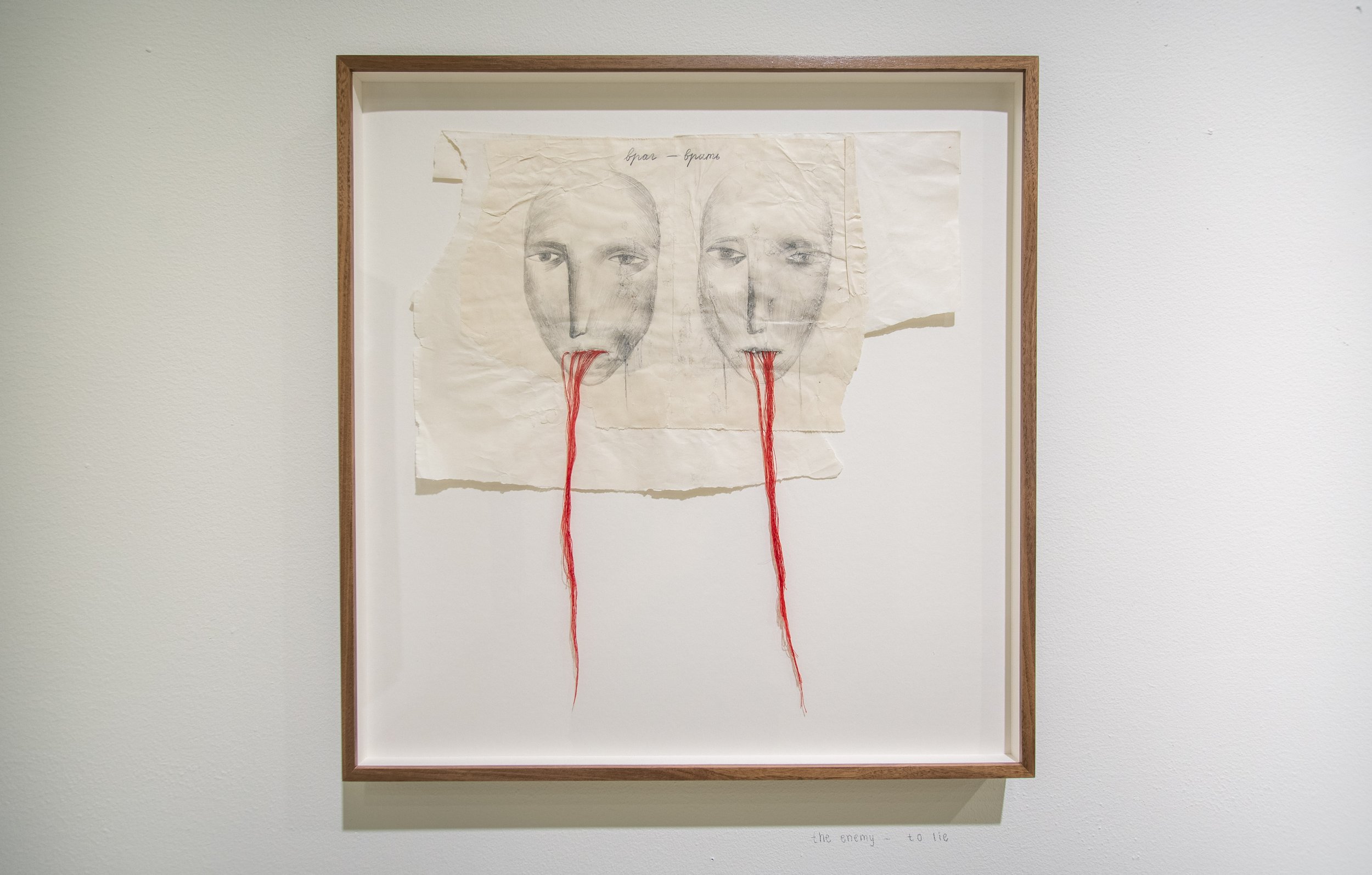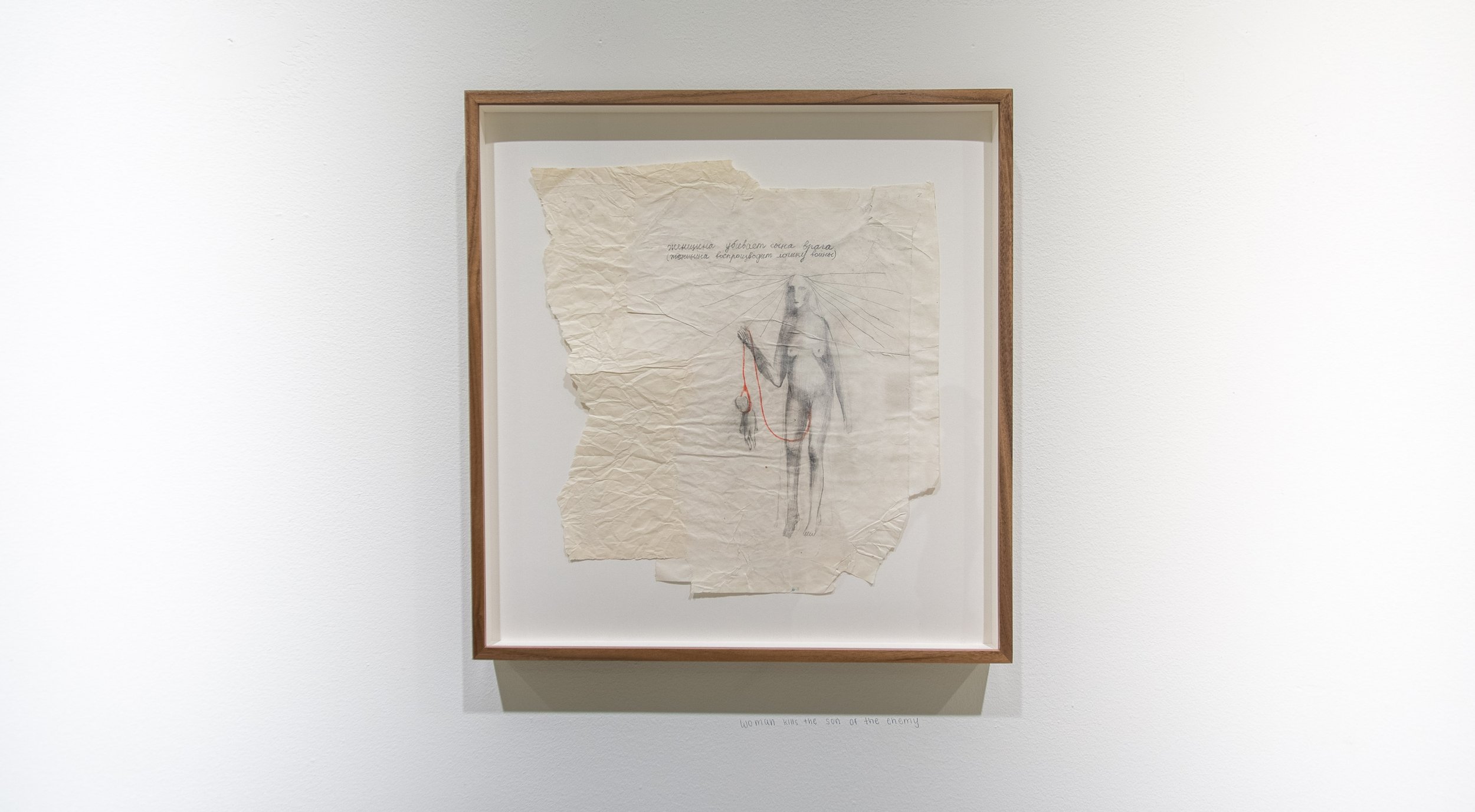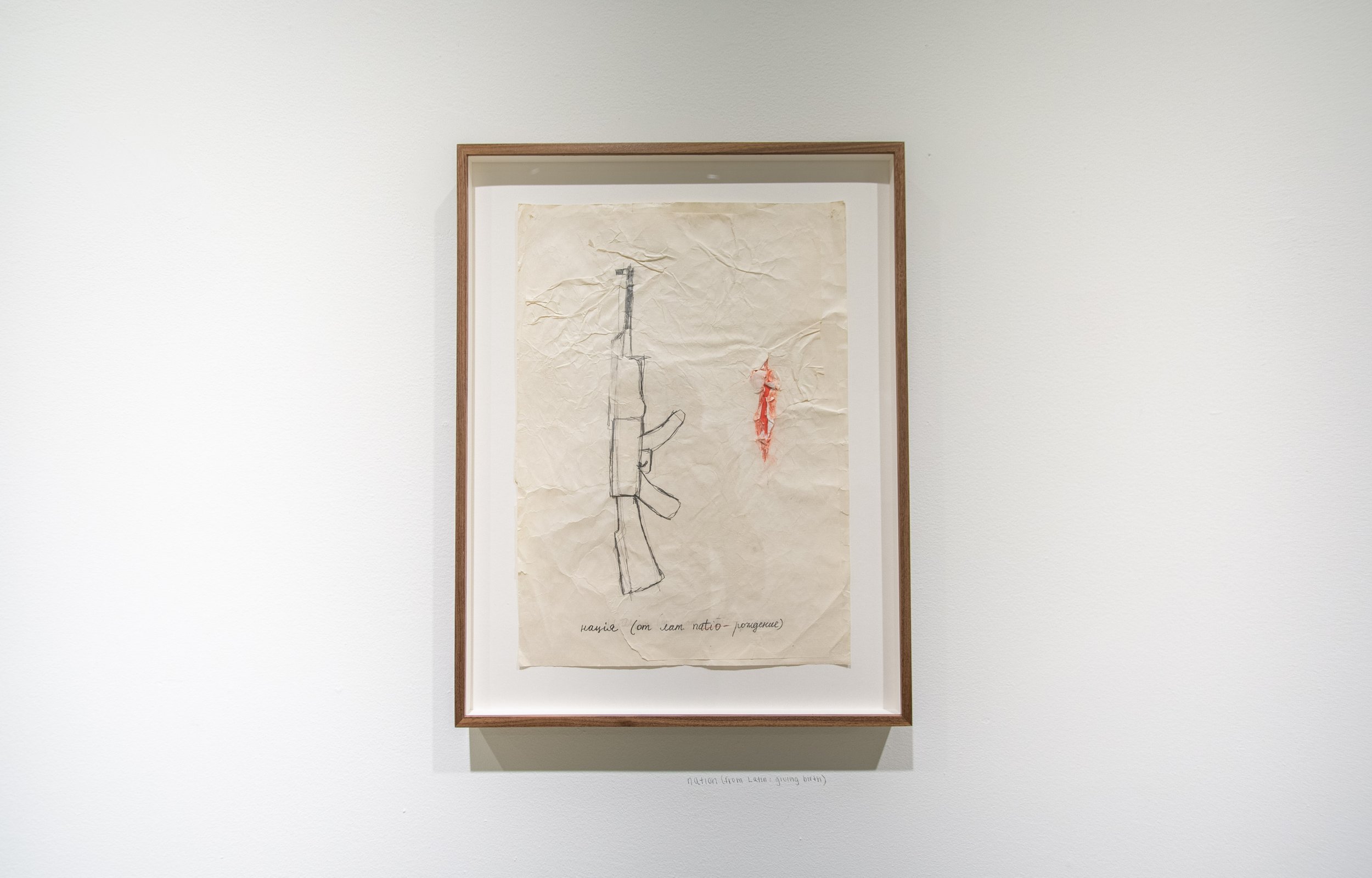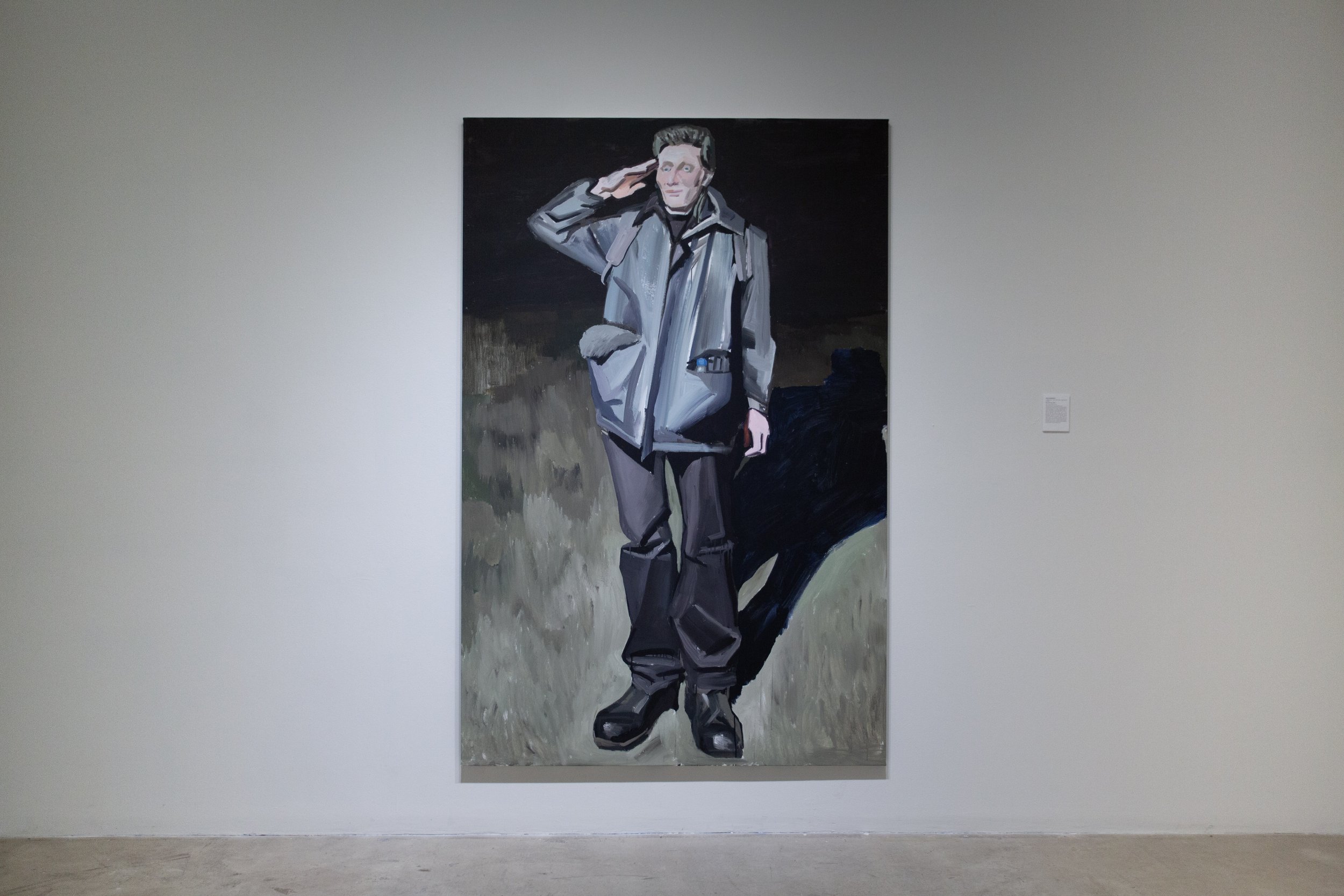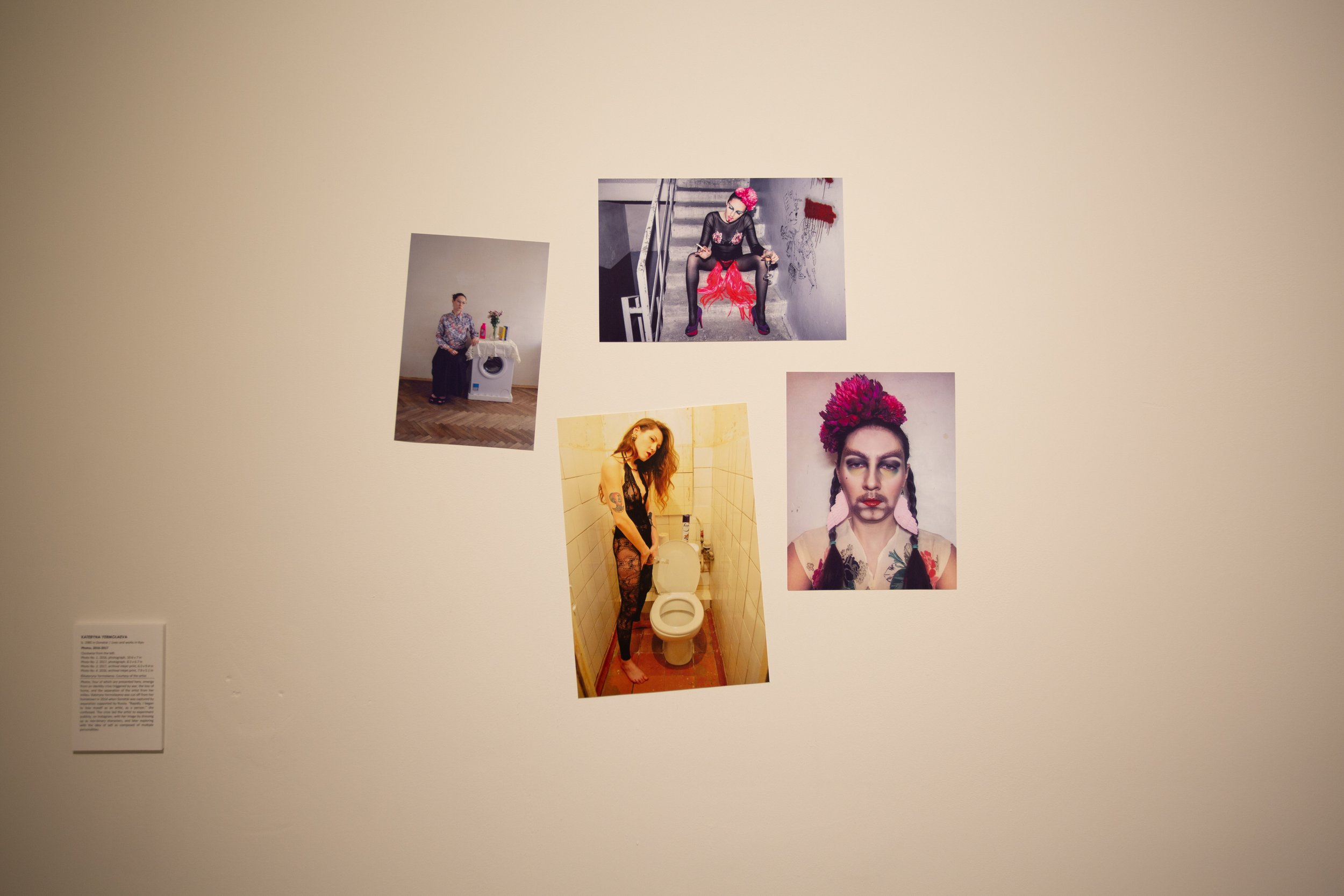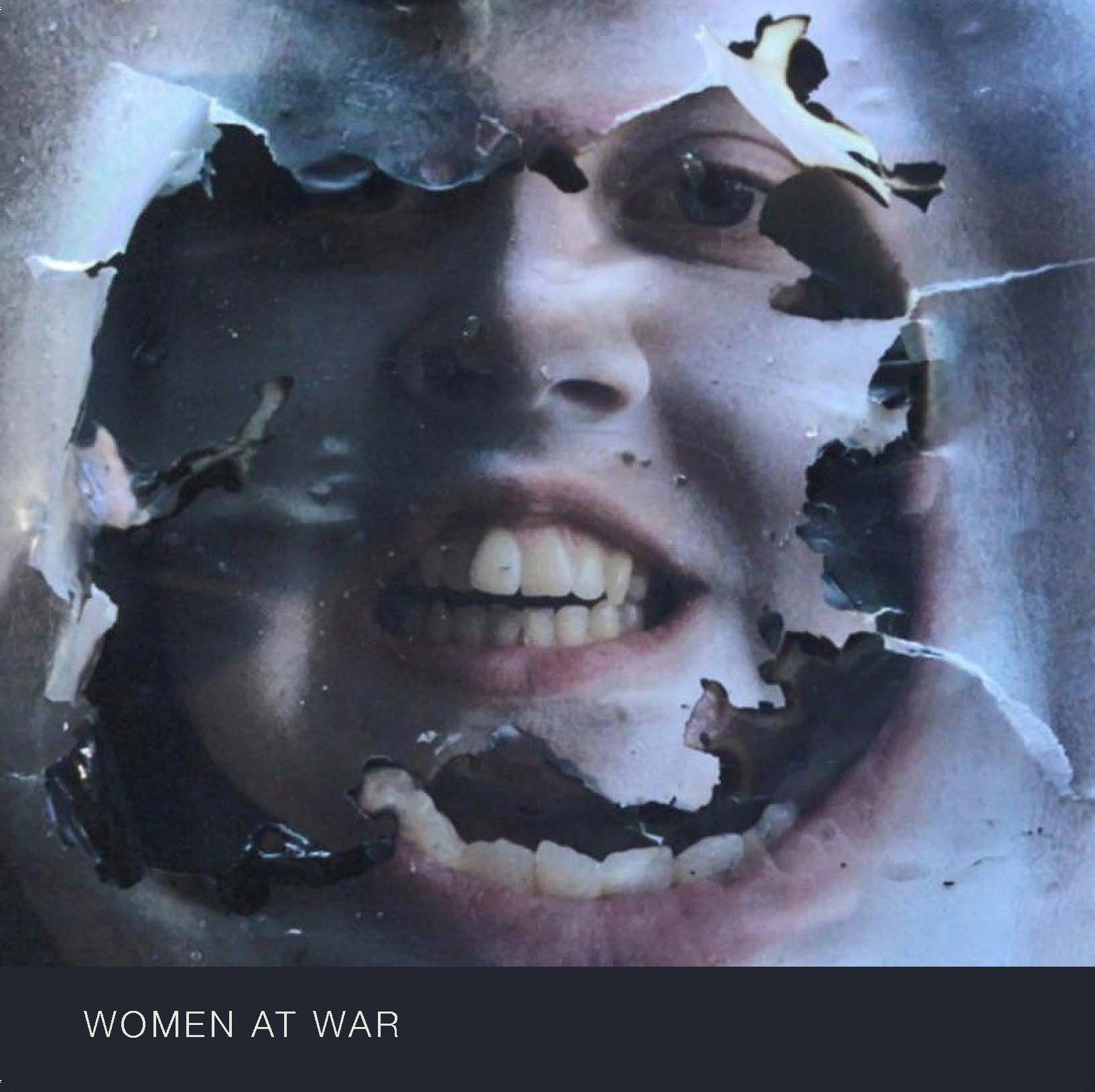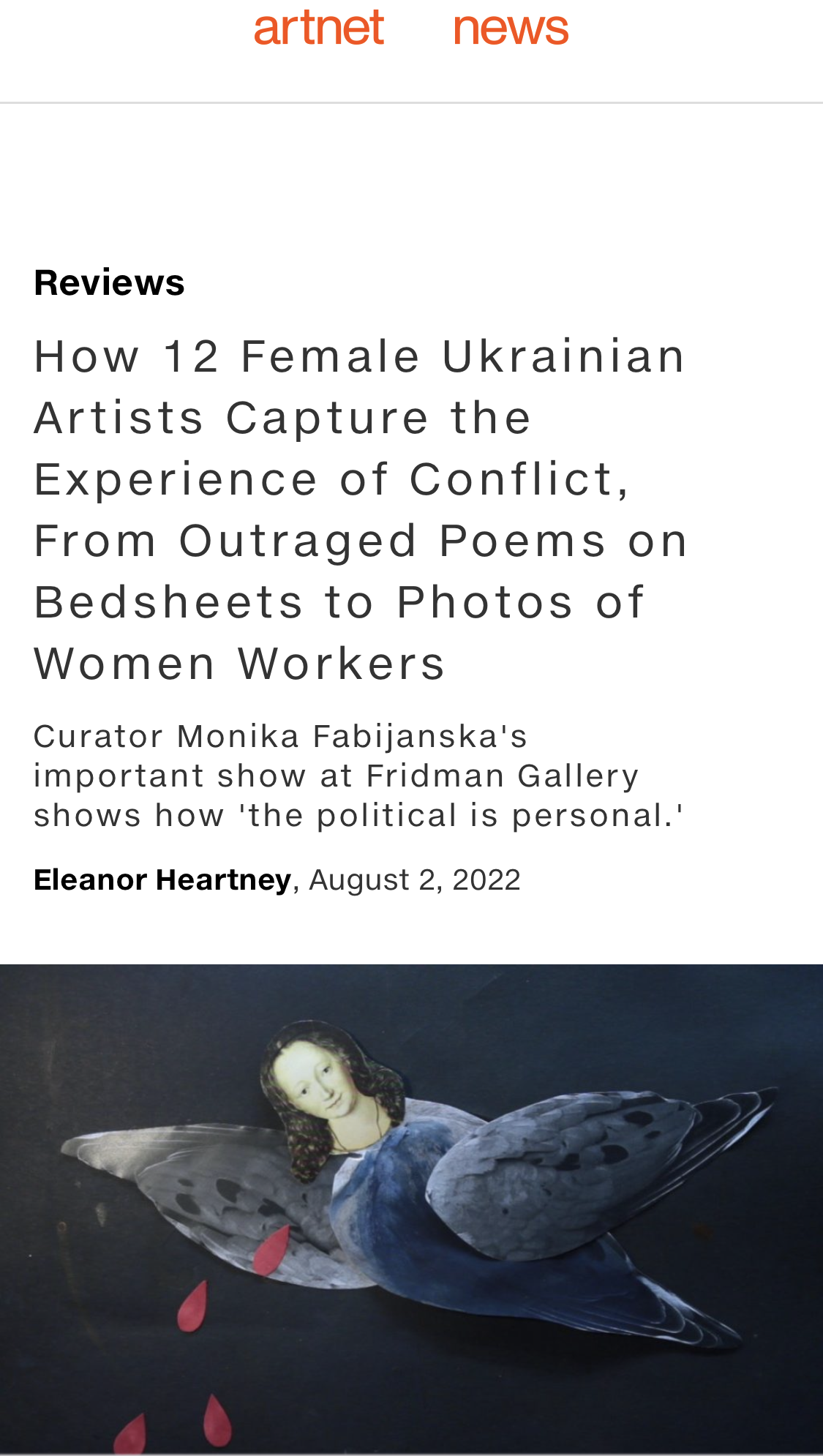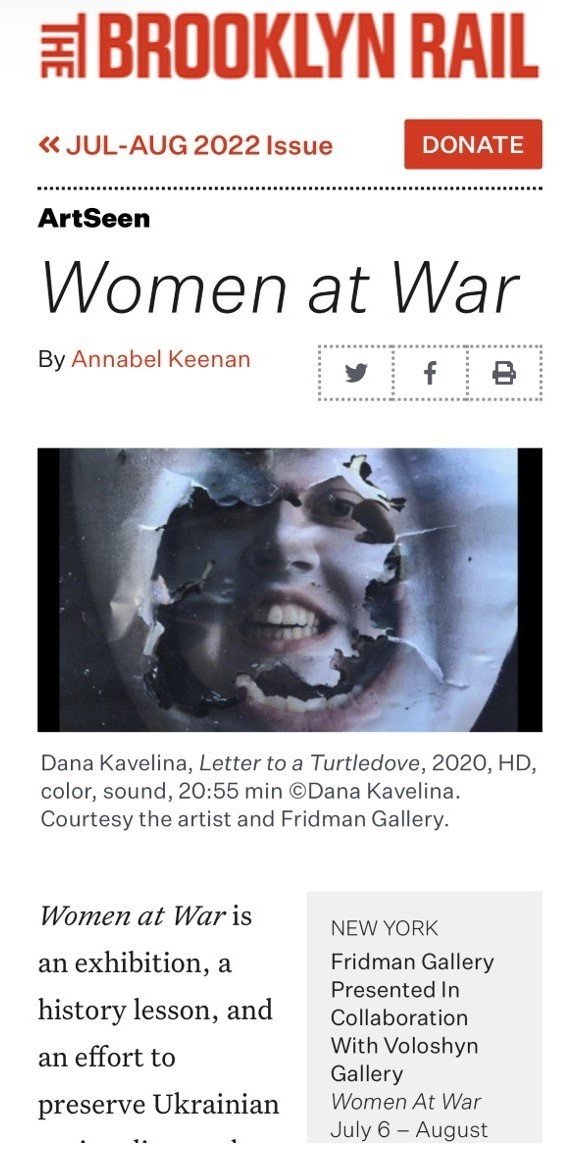The Washington Post’s and Frieze Magazine’s
10 best art exhibitions in 2022
Dana Kavelina, a still from Letter to Turtledove, 2020, film, 20:55 min ©Dana Kavelina. Courtesy of the artist
WOMEN AT WAR
Yevgenia Belorusets, Oksana Chepelyk, Olia Fedorova, Alena Grom, Zhanna Kadyrova, Alevtina Kakhidze, Dana Kavelina, Lesia Khomenko, Vlada Ralko, Anna Scherbyna, Kateryna Yermolaeva, and Alla Horska (1929-1970)
curated by Monika Fabijanska
Fridman Gallery, New York, NY
July 6 – August 26, 2022
EXHIBITION TOUR:
Eastern Connecticut State University, Willimantic, CT
September 12 - October 15, 2022
Wesleyan University, Middletown, CT
October 26 - November 20, 2022
Stanford in Washington, D.C.
January 12 - March 21, 2023
Florida State University Museum of Fine Arts, Tallahassee, FL
July 13 - October 28, 2023
University of Manitoba School of Art Gallery, Winnipeg, MB
February 29 - April 27, 2024
Chicago Cultural Center, Chicago, IL
August 24 - December 8, 2024
North Dakota Museum of Art, Grand Forks, ND
January 15 - March 30, 2025
Women at War among The Washington Post’s best visual art exhibitions in 2022
Women at War among Frieze Magazine’s The Top 10 Shows in the US of 2022
“Women at War,” at the Fridman Gallery, astounds. I wish everyone could see it.
- Peter Schjeldahl, The New Yorker
A small but potent exhibition
- Philip Kennicott, The Washington Post
If war has historically been waged and documented artistically by men, perhaps exhibitions like this reflect - or even subtly effect - a shift in universal historical consciousness.
- Martha Schwendener, The New York Times
If there were ever a need to take the time to fully experience an exhibition, this is it.
- Annabel Keenan, The Brooklyn Rail
Women at War features works by a selection of the leading contemporary women artists working in Ukraine, and provides a context for the current war, as represented in art across media. Several works in the exhibition were made after February 24, 2022, when Russia began full-scale invasion; others date from the eight years of war following the annexation of Crimea and the creation of separatist “republics” in Donbas in 2014.
War is central to history. History has been written (and painted) by men. This exhibition provides a platform for female narrators of history and examines the perception of war as gendered. Women are generally absent from the historical accounts of war, but violating a woman is seen as a violation of land and nation. Media images reinforce the perception of gender divide. But is war indeed gendered? Women comprise c. 25% of Ukrainian armed forces. Russian soldiers rape Ukrainian civilians of all genders, including adult men. Many artists in this exhibition struggle with the notion of victimhood and pose the question in what way women have agency during war.
The exhibition also serves as a gateway to Ukrainian and other Eastern European feminisms, which are significantly different from the Western mold. Finally, Women at War will contribute to a conversation about how national identity is tied to the perception of women’s role in society. There are parallels between the fight for Ukraine’s independence and the fight for its women’s equality. They stem from the paradoxes of the Soviet Union, where early modernist, anti-nationalist, and feminist promises remained but a fig leaf of propaganda in the brutal and misogynist patriarchal empire it became.
Ukrainian art of the 2010s was largely focused on the discussion of whether Ukrainian identity should draw directly upon the short period of pre-Soviet independence or include the legacy of the Ukrainian SSR. This, in the country burdened with its colonial past, the unimaginable wounds of the 20th century (Holodomor, two world wars, the Holocaust), and the reality of a crisis, led to a national fixation on history. The young generation of artists focused their attention on historiography – how history is written, who writes it, who and what remains invisible. Soviet painting, especially the interpretations of WWII, came into focus of many artists. Others organized around the critique of decommunization – the destruction of Soviet monuments and mosaics in Donbas spearheaded by the post-Maidan government – and turned towards the forgotten pages of history.
Dana Kavelina (b. 1995 in Melitopol) focuses on the perception of war outside the mainstream narratives. Letter to a Turtledove (2020) is an experimental anti-war film-poem about women in the Donbas conflict zone, which invites us “to think of a victim as a certain subjective agency who is not involved in the reproduction of violence yet absorbs it. This is her strength.” The subjectivity of the victim and gender roles of women during war are also explored by Alena Grom (b. 1976 in Donetsk) in the Womb series (photography, 2018), inspired by the stories of women who gave birth while living in the war zone in Donbas; Oksana Chepelyk’s (b. 1961 in Kyiv) Letter from Ukraine (video, 2014), which abstracts the war role of a mother into a choreography; and a drawing diary of everyday horrors of the war by Vlada Ralko (b. 1969 in Kyiv), published daily on Instagram (2022), which follows her famous Kyiv Diary (2013-2015).
A vivid discussion about historiography among Ukrainian artists concerns historical painting. This critique is central to art practices of conceptual painters Lesia Khomenko (b. 1980 in Kyiv), whose Max in the Army – a monumental full-figure portrait of Khomenko’s partner, an artist himself, joining Territorial Defense of Ukraine – was painted in March of 2022, and Anna Scherbyna (b. 1988 in Zaporizhia), whose Some landscapes of the left-bank Ukraine (watercolors, 2016-19) subvert the historical genre of painted ruins, depicting the ruins of Donbas as miniature watercolor landscapes.
Another artist investigating the role of art in historiography, Yevgenia Belorusets (b. 1980 in Kyiv), focuses on the connections between authenticity and responsibility in documentary art forms, and chooses Ukraine’s invisible groups as her subjects. Victories of the Defeated (2014-1017) is a cycle of more than 150 photographs and texts devoted to post-industrial Ukraine, coal miners on the edge of the war zone, and contemporary forms of labor.
Alevtina Kakhidze’s (b. 1973 in Zhdanivka, Donetsk oblast) piercing series of drawings, Strawberry Andreevna (2014-2019), covers four years of telephone conversations with her mother who stayed in the occupied territories in the Donetsk region. It ends in January 2019, when Ms. Andreevna died of a cardiac arrest while crossing the demarcation line between the self-proclaimed “Donetsk People’s Republic” and Ukraine to receive her pension.
Zhanna Kadyrova (b. 1981 in Brovary, Kyiv oblast) created Palianytsia (2022) in a village in Western Ukraine, where she evacuated from Kyiv. Large stones smoothed in local rivers reminded her of the typical Ukrainian bread, palianytsia. Because Russian occupiers cannot pronounce it properly, the word is now used to distinguish friend from enemy.
A consequence of the political situation of Ukraine is a mental health crisis, about which women artists speak openly. In the words of Dana Kavelina, “depression is the only adequate strategy in a situation where it is impossible to influence real political processes.” Kateryna Yermolaeva (b. 1985 in Donetsk), cut-off from her family and home in Donbas, suffered an identity crisis. It led the artist to dress up as non-binary characters, and experiment with the idea of self as composed of multiple personalities (Photos, 2016-). In Olia Fedorova’s (b. 1994 in Kharkiv) poetic take on Land Art titled Defense (2017), anti-tank hedgehogs are made of paper to symbolize the futility of the mind’s attempt to escape the reality of war. During recent Russian shelling of Kharkiv, in an underground bomb shelter, she created poems-prayers written on bed linen. Tablets of Rage (2022) echo the history of women’s work with textiles, not only as a form of creative expression but as an important healing and meditative practice.
The exhibition features a drawing by Alla Horska, on loan from the Ukrainian Museum in New York, situating this contemporary art exhibition within the context of Ukrainian feminist legacy. Both Alla Horska (1929-70) – an artist and dissident – and poet Ivan Svitlichny (1929-92) whom she portrayed, fought to preserve Ukraine’s culture and language under the communist regime. In 1970, at the age of 41, Horska was murdered by the KGB. Her name was adopted as a nom de guerre by one of the Guerrilla Girls.
This exhibition is a collaboration among Voloshyn Gallery, a prominent art gallery in Kyiv, currently operating from Miami, FL; Fridman Gallery in NYC; and curator Monika Fabijanska. During the last three months, we have been working together to bring to New York the art of these outstanding artists, many of whom stayed in Ukraine, while some found temporary refuge in the West. Several of the works presented in Women at War were featured in museum exhibitions and biennials internationally.
PRAISE FOR WOMEN AT WAR
“Women at War,” at the Fridman Gallery, astounds. I wish everyone could see it. […]
The show is elegantly and, above all, eloquently installed by Monika Fabijanska, an independent art historian and avowedly feminist curator who hereby does Ukraine, and any of us who willingly pay attention, a cathartic service.”
- Peter Schjeldahl, The New Yorker
“The refusal of victimhood is the most pervasive idea uniting these works, even in images that deal directly with rape as a tool of war. This requires resistance not just to contemporary ideas and labels, but to narrative ideas and poetic images as old as civilization: that women are the vessels of wartime trauma and their bodies a canvas on which men write history with the lacerating quill of violence. Thus, Euripides in 415 B.C. in “The Trojan Women”: ‘And forth, lo, the women go,/The crown of War, the crown of Woe,/To bear the children of the foe …’”
- Philip Kennicott, The Washington Post
“If war has historically been waged and documented artistically by men, perhaps exhibitions like this reflect - or even subtly effect - a shift in universal historical consciousness.”
- Martha Schwendener, The New York Times
“Feminism in Ukraine takes a different tack than feminism in the West. It is not so much that “the personal is political,” as Western feminists have declared. It is more that “the political is personal.” Seared into their bodies and their consciousness, the current war reveals women artists reevaluating their status as women, citizens, and members of the human race.”
- Eleanor Heartney, Artnet
„Women at War is powerful, sensitive, and heartbreaking. It takes on a complex, emotional task that is far beyond the scope of one review. Every work teaches the viewer a story. The wall labels, the essay by Fabijanska, and the works themselves make sure that the viewer leaves understanding something deeper about the historic and present-day wars in Ukraine. If there were ever a need to take the time to fully experience an exhibition, this is it.”
- Annabel Keenan, The Brooklyn Rail
“In drawings, film, even handwriting on scraps of bed linen, these artists are history's witnesses to the realities of war: its dailiness and the toll it takes.”
- Barbara Stamberg, NPR
“For Vladimir Putin – the Russian leader who continues to deny Ukrainian statehood – the aim of the current war is not only the conquest of land, but the erasure of identity. Ukrainian artists are therefore faced with the unique pressure of […] stewarding a contentious historiography. […] While war narratives are overwhelmingly masculine, these women artists present paintings, drawings and videos that serve as unflinching feminist battle cries at the discursive frontiers of history.”
- Zoë Hopkins, Frieze
“Women at War draws attention to ongoing war and the fight for a Ukrainian national feminist identity, but it also examines larger, geographically broad questions of history and its authorship. We owe all women at war this reexamination.”
- Nina Mdivani, Hyperallergic
PUBLIC PROGRAMS
PUBLIC PROGRAMS, Fridman Gallery, NYC:
Wednesday, July 6, 2022, 1-5 PM – Press Preview Day
Wednesday, July 6, 2022, 5-8 PM – Opening Reception and Performance by Ukrainian Village Voices
Thursday, July 7, 2022, 6 PM – Curatorial Walkthrough with Monika Fabijanska
Wednesday, July 13, 2022, 1 PM – Conversation with the Artists (virtual): Dana Kavelina and Olia Fedorova
Wednesday, July 20, 2022, 8 PM – Screening (in person): Alexander Dovzhenko's silent film Zemlya (1930) with soundtrack by DakhaBrakha
Wednesday, July 27, 2022, 1 PM – Conversation with Artists (virtual): Lesia Khomenko & Anna Scherbyna with special guest Ksenia Nouril (Print Center, Philadelphia)
Wednesday, August 10, 2022, 1 PM – Conversation with Artists (virtual): Zhanna Kadyrova and Alevtina Kakhidze
Wednesday, August 17, 2022, 1 PM – Conversation about Alla Horska's (1929-1970) legacy in art and politics
with Ukrainian art historians Dr. Lizaveta German, Dr. Olga Balashova, and Evgenia Molyar (virtual)
Wednesday, August 24, 2022, 7 PM – Join curator Monika Fabijanska for the closing curatorial walkthrough of Women at War (in person)
PUBLIC PROGRAMS, Stanford in D.C.:
Thursday, January 12, 2023, 6-8 PM – Opening reception
Wednesday, January 25, 2023, 12 PM – Conversation with artist Alevtina Kakhidze, who has served as United Nations Tolerance Envoy in Ukraine (virtual)
Wednesday, February 8, 2023, 7 PM – Conversation with Dorothy Kosinski, Director Emerita, The Phillips Collection and Monika Fabijanska, Curator of the exhibition (in person)
Tuesday, February28, 2023, 12 PM – Screening of Letter to Turtledove by Dana Kavelina and conversation with the artist (virtual)
Wednesday, March 8, 2023, 7 PM –Women and Art in a Time of War: A Conversation. Moderated by Sonya Michel, professor emerita, University of Maryland, with Blair Ruble, a Distinguished Fellow at the Wilson Center; Aneta Georgievska-Shine, University of Maryland; artist Marta Perez Garcia (in person)
PUBLIC PROGRAMS, Florida State University Museum of Fine Arts, Tallahassee:
September 28, 2023, 6 PM – Curator’s Lecture
September 29, 2023, 10 AM – Curator’s Exhibition Tour
October 12, 2023, 6 PM – Conversation with artist Lesia Khomenko
PUBLIC PROGRAMS, School of Art Gallery, University of Manitoba, Winnipeg:
February 29, 2024, 12 PM – Curator’s Lecture
March 1, 2024, 12 PM – Curator’s Exhibition Tour
March 11, 2024, 7 PM – Professors Iraida & Michael Tarnawecky 2024 Distinguished Lecture: Ihor Ostash
March 14, 2024, 12 PM & March 21, 6 PM – Ukrainian Language Exhibition Tours
March 21, 2024, 7 PM – Screening: Short Films by Dana Kavelina
March 27, 2024, 12 PM – Lesia Khomenko Artist Talk
April 11, 2024, 12 PM – Live-stream - Monika Fabijanska, Olia Fedorova & Alevtina Kakhidze in Conversation
PUBLIC PROGRAMS, Chicago Cultural Center:
October 18, 2024, 5:30 PM – Guided Tour with the Curator, Michigan Avenue Galleries, 1st Floor East
October 18, 2024, 6:30 PM – Exclusive Interview: Monika Fabijanska with Critic Susan Snodgrass, Millennium Park Room, 5th Floor South
October 19, 2024, 1 & 3 PM – Guided Tours with the Curator, Michigan Ave Galleries, 1st Floor East
November 13, 2024, 12 PM – Expert-Led Tour with Magdalena Moskalewicz, Ph.D., Michigan Avenue Galleries, 1st Floor East
November 17, 2024, 1 PM – Dispatches from Ukraine: Dana Kavelina short film Letter to a Turtledove (2020, 21 min) screened before 20 Days in Mariupol (dir. Mstyslav Chernov, 2023, 94min), Claudia Cassidy Theater, Chicago Cultural Center, 2nd Floor North
December 8, 2024, 1 PM – 9'31" performance by Maria Plotnikova, Michigan Avenue Galleries, 1st Floor East
December 8, 2024, 1:30 PM – Screening of Dana Kavelina’s short films: Mark Tulip, who spoke with flowers (2018), Letter to a Turtledove (2020), and Monuments (2022), Claudia Cassidy Theater, 2nd Floor North
PUBLIC PROGRAMS, North Dakota Museum of Art, Grand Forks:
January 24, 2025, 12 PM & January 26, 2 PM – Gallery tours led by Museum Curator, Anna Sigridur Arnar
February 27, 2025, 4 PM – Curator’s Talk by Monika Fabijanska at the NDMA. Watch live stream.
February 28, 2025, 9 AM – The University Council of Women+ Breakfast to kick off Women’s History Month, with Monika Fabijanska and a panel discussion including prof. Brian Urlacher, Professor of Political Science and Nicole Derenne, Professor of Art and Design, at the University of North Dakota Memorial Union.
February 28, 2025, 6 PM – A screening of films by Women at War artists, at the Empire Arts Center:
– Alevtina Kakhidze, All Good, 2024, 19:57 min – The North American Premiere
– Dana Kavelina, Marc Tulip Who Spoke with Flowers, 2018, 15:19
– Dana Kavelina, Monuments, 2022, 34:35 min
– Q&A with artists via Zoom.

